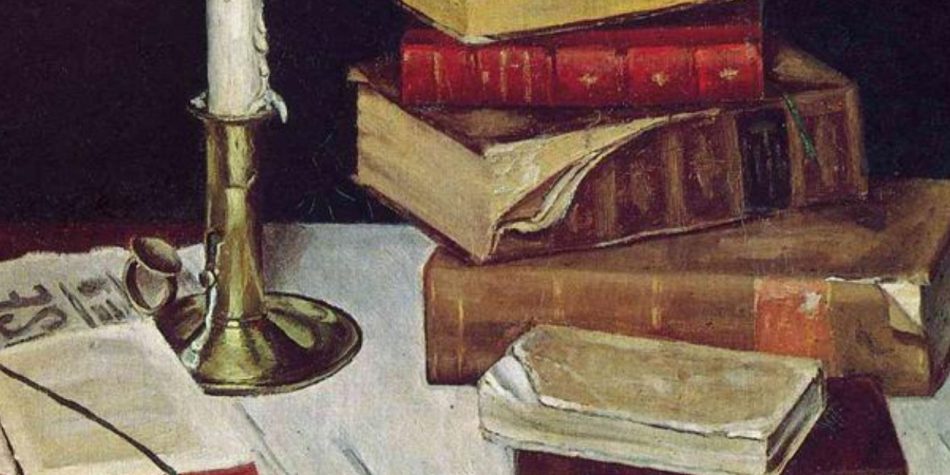Anna Karenina
Leo Tolstoy
More interesting than the arc of Anna’s tragic downfall is the spiritual journey of Konstantin Levin. He is the novel’s conservative, monogamous opposite to the freewheeling, belly-worshipping Anna and her paramour Vronsky.
Levin struggles to understand and embrace faith. His wrestle with things divine torments him. His wife, Kitty, sees his soul through the softening filter of love. Knowing of his kind nature, she can say, “Well, so what if he does not believe? Better to let him always be [kind].” And a few paragraphs later: “How can anyone say he does not believe? With that heart of his, and that fear of upsetting anyone, even a child! Everything for others, nothing for himself.” Amid these thoughts, she looks at their newborn son and says, “Yes, you be just like your father, just like him.”
Levin’s crisis—which reflects Tolstoy’s own real-life difficulty—is existential. It is “about what he was and what he was living for.” The more he reads and the more he thinks, “the further he felt from the goal he was pursuing.” At one point, as he considers the work he is doing and making others do on his estate, the crisis is encapsulated in a question: “What is the point?”
It is one of Levin’s peasants, Fyodor, who helps him see the light. Fyodor speaks of a righteous man they both know who “lives for his soul” and “remembers God” by “obeying the truth, obeying God’s will.” Levin abruptly cuts off his conversation with Fyodor, feeling at once the blossoming of something new and beautiful within him. In an extended interior monologue, Levin tells us interesting things about the source of his newfound knowledge.
“I haven’t discovered anything,” he says. “I have just found out what I know. … I looked for an answer to my question. But rational thought could not give me an answer to my question, as it is incommensurate with the question. The answer has been given to me by life itself, in my knowledge of what is good and what is bad. But there was no way that I could acquire this knowledge; it was given to me as it is to all people—given, because there was nowhere that I could have taken it from.
“Where did I get it from ? Was it through reason that I came to know one must love one’s neighbor and not strangle him? They told me that in my childhood, and I believed it gladly, because they told me what was in my soul. But who discovered that? It was not reason. What reason discovered was the struggle for existence, and the law demanding that I strangle all those who obstruct the satisfactions of my desires. That is the conclusion of reason. But reason could never discover loving one’s neighbor, because that is something unreasonable.”
Levin emerges from this revelatory reverie certain that he will now be good and kind to everyone around him. His first interaction with another person displays his naivete—and also a beautiful streak of humanity that makes him such a relatable, endearing character. Maybe a minute later, his servant Ivan approaches in a coach. Levin wants to display his newly acquired saintliness and engage his servant in a pleasant conversation. But Levin can’t help himself. He can only notice the mistakes Ivan has made in saddling the horse.
As they drive along, with Levin holding the reins, Ivan gently corrects his master. “Best keep to the right, sir, there’s a stump.”
“Please let go and don’t teach me!” Levin responds, shattering his hopes of unimpeachably charitable living.
And so the narrator tells us, “It was with sadness that [Levin] immediately recognized how mistaken he had been in presuming that his spiritual state of mind could instantly change him when he came back into contact with reality.”
The Road to Character
David Brooks
Much of the Western world is oriented around the gods of achievement and consumption. We focus more on acing job interviews and surrounding ourselves with material delights than we do on building a moral life. In this important book from 2015, New York Times columnist David Brooks points to résumés and eulogies to help illustrate why the latter will always outweigh the former.
“The résumé virtues are the ones you list on your résumé, the skills that you bring to the job market and that contribute to external success,” Brooks writes. “The eulogy virtues are deeper. They’re the virtues that get talked about at your funeral, the ones that exist at the core of your being—whether you are kind, brave, honest or faithful; what kind of relationships you formed.”
He continues: “Most of us would say that the eulogy virtues are more important than the résumé virtues, but I confess that for long stretches of my life I’ve spent more time thinking about the latter than the former. Our education system is certainly oriented around the résumé virtues more than the eulogy ones. Public conversation is, too—the self-help tips in magazines, the nonfiction bestsellers. Most of us have clearer strategies for how to achieve career success than we do for how to develop a profound character.”
There are surely better books than this one to help us build character. The Hebrew Bible and the Greek New Testament are two of them. Yet Brooks’ text is valuable because it can speak to those for whom scripture is a foreign language. He shares examples from those of recent memory—Dwight D. Eisenhower, Dorothy Day, and others—whose exemplary lives can be models for moderns.
Brooks’ analysis ends with a Humility Code to help disoriented souls lay a lasting moral foundation that will yield joy. He encourages us to “live for holiness.” He reminds us that “we are flawed creatures” but “we have the capacity to recognize sin, to feel ashamed of sin, and to overcome sin.” He tells us that the road to character is a social path. “Everybody needs redemptive assistance from the outside—from God, family, friends, ancestors, rules, traditions, institutions, and exemplars.” He warns us that we do not know enough. “Wisdom starts with epistemological modesty. The world is immeasurably complex and the private stock of reason is small. … The humble person understands that experience is a better teacher than pure reason.” He counsels us to seek our individual calling. “No good life is possible unless it is organized around a vocation. … A vocation is not found by looking within and finding your passion. It is found by looking without and asking what life is asking of us. What problem is addressed by an activity you intrinsically enjoy?”
A life spent in the pursuit of character is a life of joy. Brooks describes such joy as “those fleeting moments you know why you were put here and what truth you serve. You may not feel giddy at those moments, you may not hear the orchestra’s delirious swell or see flashes of crimson and gold, but you will feel a satisfaction, a silence, a peace—a hush. Those moments are the blessings and the signs of a beautiful life.”











